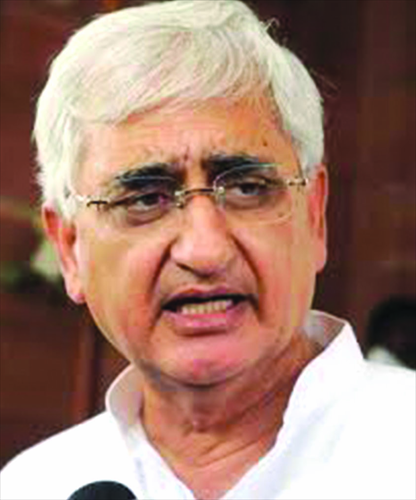India won't sacrifice one friendship for others

Shri Salman Khurshid
Editor's Note:
Indian Prime Minister Manmohan Singh is set to visit China this autumn, realizing an exchange of prime ministerial visits after Chinese Premier Li Keqiang's visit to India in May. What's the significance of this visit? How do Indian elites view India-China relationship? Shri Salman Khurshid (Khurshid), Indian external affairs minister, shared his views with the Chinese journalist delegation at the first India-China Media Forum last week.
Q: What's your assessment of the current India-China relations? What are your priorities in developing the bilateral relationship?
Khurshid: There are very strong fundamentals that provide a base for building sustainable relationship between India and China. These fundamentals include complementarities between our two economic and social structures. They include imperatives of working closely together in the world on many issues that are of important common interests. They also include some matters essentially pertaining to our region, and also about our perceptions of an equitable global system.
Having said all this, there will be periodic issues of divergence. China has a very important relationship with Pakistan ... Our concern in China's relationship with Pakistan is about the impact on nuclear nonproliferation. Perhaps the other concern is that the extent to which your collaboration and help to them is concentrated in the area that we believe they have occupied forcibly.
And of course there is our common endeavor and effort to move step-by-step toward resolving our boundary issue. I think we can say with satisfaction the Special Representatives and other mechanisms in place are moving steadily. We have decided not to push the pace so that it gives way rather than continuing to make progress.
Q: Both Washington and Tokyo are trying to win over India in their efforts to encircle China. To what extent will it affect New Delhi's China policy?
Khurshid: Nobody, neither the Japanese and the Americans, has told us to participate in an encircling maneuver against China. India and China celebrate the relationship as strategic comprehensive partnership. They don't say to us why you are doing this. Because if they did, we would say, "Why do you deal with China?"
China's biggest investment is from Japan and biggest debt is owed by the US. If they are dealing with you in their best interest, why shouldn't we are dealing with you? Why should we subject ourselves to someone else?
We are very clear. We have an open and honest relationship with China. We also have an open and honest relationship with the US and Japan. When there are differences between you, we think and we always advise that we should not get involved. It's best if those matters are settled through dialogue.
Q: Prime Minister Manmohan Singh will visit China next month. What is the significance of his visit to Beijing?
Khurshid: We are very honored and pleased that Chinese Premier Li Keqiang's first stop outside the country as prime minister was in India. That is an important and significant indication of our relationship coming from your side ... Our prime minister has made a personal investment in improving the relationship between the two leaderships. We would like to see even more visits from China.
Q: In the Internet era, public opinion is actively engaged in foreign affairs, bringing extra pressure to the policymaking process. It is a challenge faced by governments all over the world. How do you balance the public's desire to participate with making the best diplomatic decision?
Khurshid: This is a very difficult question. The system of the governance and the system of public engagement and involvement in policymaking we have followed traditionally have been in a sense bypassed by social media. In some places, social media strengthens the existing system by making them more affordable and accessible, making them more transparent and more responsive.
To that extent, social media has been a great asset. But in some cases it has tried to bypass existing systems, which is not a good thing. People have to understand governance and the structure of government, and the structure of democracy. That can be easily undermined by social media that has no social responsibility.
We have had cases where irresponsible social media comments have caused migrations of huge number of young people working in another part of India back to their own State, because somebody had a message going viral saying if you don't leave, you will be attacked. This is completely unacceptable. If you try to restrict it, people complain about the censorship and lack of freedom and so on. We have to find a balance. Freedom comes with responsibility.
Q: Chinese telecom companies Huawei and ZTE have both been frustrated in their efforts to expand into the Indian market. To Chinese investors, India is a very difficult market to enter. What's the Indian policy toward investment from China?
Khurshid: The telecom and electronics sector you mentioned is special. I don't think the concern felt by Chinese industry vis-a-vis those sectors is common across the board with other Chinese equipment and products. There is a concern that is partly protection of Indian manufacturers, partly the security issue involved in electronics.
I think we are resolving it. Even within our own government, there is different view of how much concern should be followed and toward what extend. This is only a learning experience, because this is something relatively new to the Indian market. These are the matters that will be sorted out and resolved.